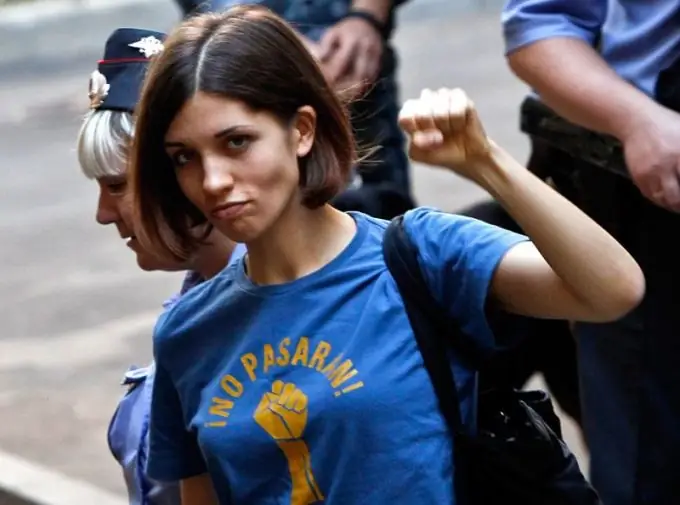- Author Antonio Harrison [email protected].
- Public 2023-12-16 07:44.
- Last modified 2025-01-22 21:44.
The punk band Pussy Riot became known all over the world thanks to the unauthorized prayer service performed in the Cathedral of Christ the Savior. After him, a criminal case was initiated against the participants of the action.

On February 21, 2012, five girls at the altar of the Cathedral of Christ the Savior performed an act, which was then dubbed a punk prayer by the media. Law enforcement authorities considered this action to be hooliganism, and three members of the group - Yekaterina Samutsevich, Maria Alekhina and Nadezhda Tolokonnikova - were detained pending the end of the investigation. The investigation over Pussy Riot caused a resonance not only in Russian society, but also in many countries. In support of the girls, rallies were organized in Perm, Kaliningrad, St. Petersburg, Berlin, Toronto and many other cities. They were demanded to be released by world-class pop stars such as Madonna and legendary Sir Paul McCartney.
Nevertheless, a rather lengthy investigation for the article "hooliganism" ended in a lawsuit. Five months after the arrest, the girls were brought before the Khamovnichesky court in Moscow. Initially, the alignment was extremely clear: the prosecution needed to prove the motive of religious hatred in order to justify the preventive measure in the form of detention (and the terms were extended three times during the investigation), which is used in case of malicious hooliganism.
The defense needed to prove the political motives of the act. According to the most widespread version in the media, Pussy Riot sang the song "Mother of God, drive Putin away!" But the staff of the Cathedral of Christ the Savior, heard on the first day of the trial, could not confirm this version. They did not hear any political statements, but from the lips of the girls sounded the phrase "God shit" and insults to the Patriarch.
The defense failed to prove the political nature of the action, and they somewhat changed their tactics. The girls began to talk about their ignorance about the ban on women from entering the pulpit. Therefore, the order in the temple is not violated from evil. But at the disposal of the court was a video recording of the group's preparation for the action, where one of the girls said: "We will serve the punk prayer at the altar, because women are not allowed to enter there."
Thus, these arguments of the defense fell away. Well, the judge managed to formulate the reasoning part of the verdict, which insists on the motive of religious hatred. All girls were found guilty and sentenced to two years in a general regime colony.
The journalists were not allowed to announce the verdict. In the courtroom and next to it, according to eyewitnesses, about two thousand people gathered. At 14.00 an action in support of the accused was appointed by an active group. At this time, the girls were brought to the courthouse and they were in the convoy awaiting the verdict. Soon Judge Marina Syrova began to read it. There was a live video broadcast from the courtroom. During the reading of the verdict, which lasted several hours, the defendants were handcuffed and guarded by eight police officers.
All this time, paddy wagons drove away from the courthouse, loaded with supporters of the acquittal of the members of the Pussy Riot group, detained by the riot police.






